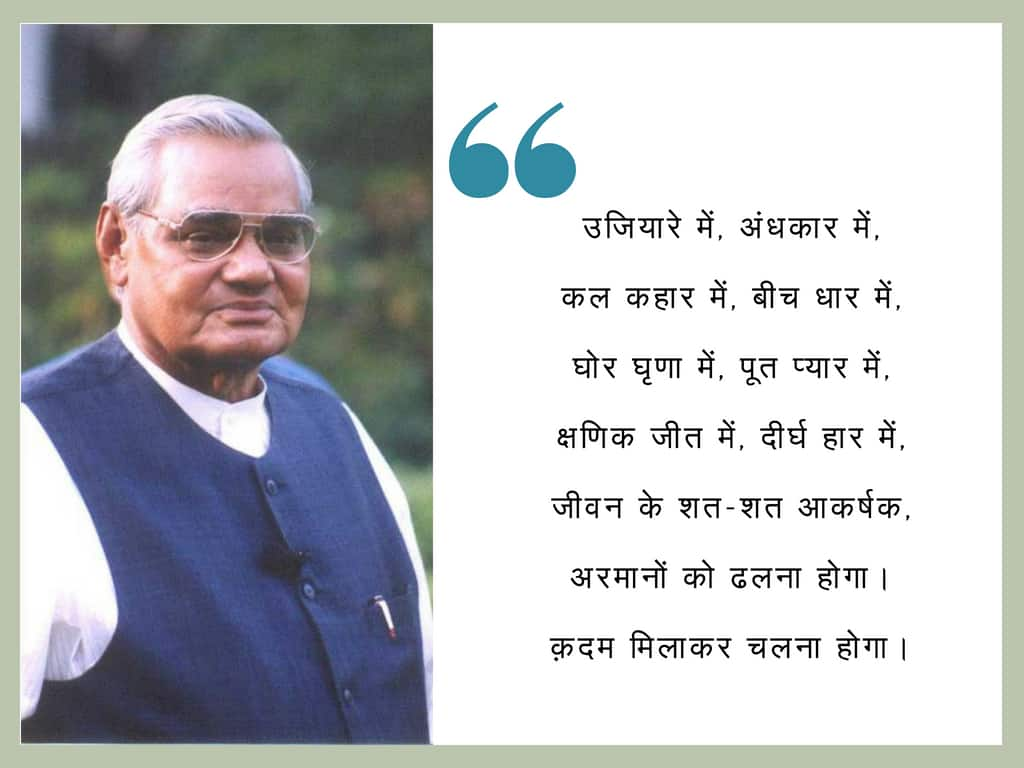From UPSC perspective, the following things are important :
Prelims level: na
Mains level: Vajpayee's best orations occurring when he was on the opposition benches.

Central idea
The article highlights the evolution of leaders within India’s parliamentary democracy, contrasting them with those from dynastic politics. It celebrates Atal Bihari Vajpayee as a prime example, emphasizing his journey from an activist to a mature statesman. The central theme underscores the virtues of leaders emerging organically through democratic processes and the challenges posed by dynastic political practices.
Key Highlights:
- The article discusses the evolution of leaders within India’s parliamentary democracy and contrasts them with those from dynastic politics.
- Atal Bihari Vajpayee is highlighted as an exemplary product of Indian parliamentary democracy, having entered politics as an activist and evolved into a mature statesman.
- Vajpayee’s role in the BJP’s rise from the fringes to the mainstream during the Congress-dominated era is emphasized.
- The article underscores Vajpayee’s oratorical skills, his role in consensus politics, and his commitment to national interests.
Key Challenges:
- Critique of dynastic politics in the Congress party post-Nehru, seen as a hindrance to embodying leadership values of parliamentary democracy.
- The challenge of maintaining decorum in political discourse, contrasting it with the current cheap antics of the Opposition.
Key Terms:
- Dynastic politics: The practice of political leadership being passed down through family lines.
- Consensus politics: The approach of seeking agreement among diverse political parties for effective governance.
- Oratorical skills: The ability to deliver powerful and persuasive speeches.
Key Phrases:
- “Leaders are born, they are not made”: Expresses the perspective on the natural emergence of leadership qualities.
- “Evil of dynastic politics”: Describes the negative impact of hereditary political leadership.
- “Teflon-coated Hindutva-vadi”: Term used to describe Atal Bihari Vajpayee, suggesting resilience in the face of criticism.
Key Quotes:
- “Leaders are born, they are not made.”
- “Dynasts can never fully appreciate and demonstrate the leadership values and principles of parliamentary democracy.”
- “Atal ji’s greatness is not limited to his prime ministership.”
Anecdotes:
- Vajpayee’s witty remark to Nehru about having a “split personality” and an “inverted vision.”
- Jaitley’s mention of Vajpayee’s obituary address for Nehru as a quality tribute to a political adversary.
Key Statements:
- “Leaders born into political families struggle to fully appreciate and demonstrate the leadership values of parliamentary democracy.”
- “Vajpayee’s commitment to consensus politics is noted, even during the challenges of leading a 23-party coalition.”
- “Vajpayee’s role as an ideal opposition leader is praised, emphasizing his support for the government during crucial times.”
Key Examples and References:
- Vajpayee’s journey from a young activist to a mature statesman within the parliamentary system.
- His criticism of Nehru’s policies and the BJP’s rise during the Congress-dominated era.
- Instances of Vajpayee’s leadership during events like the nuclear tests in 1998 and the Kargil War.
References:
- Arun Jaitley’s memorial address for Vajpayee, highlighting his oratory skills and leadership in opposition.
- Jaitley’s mention of Vajpayee’s best orations occurring when he was on the opposition benches.
Critical Analysis:
- The article critically analyzes the impact of dynastic politics on embodying democratic leadership values.
- Vajpayee is portrayed as an exemplary leader, emphasizing his oratorical skills, commitment to consensus politics, and prioritization of national interests.
Way Forward:
- Encourage a departure from dynastic politics and foster leadership emerging through democratic processes.
- Advocate for a return to decorum in political discourse and a focus on consensus politics for effective governance.
- Learn from Vajpayee’s legacy, striving for political environments that prioritize national interests over partisan considerations.
Get an IAS/IPS ranker as your 1: 1 personal mentor for UPSC 2024
